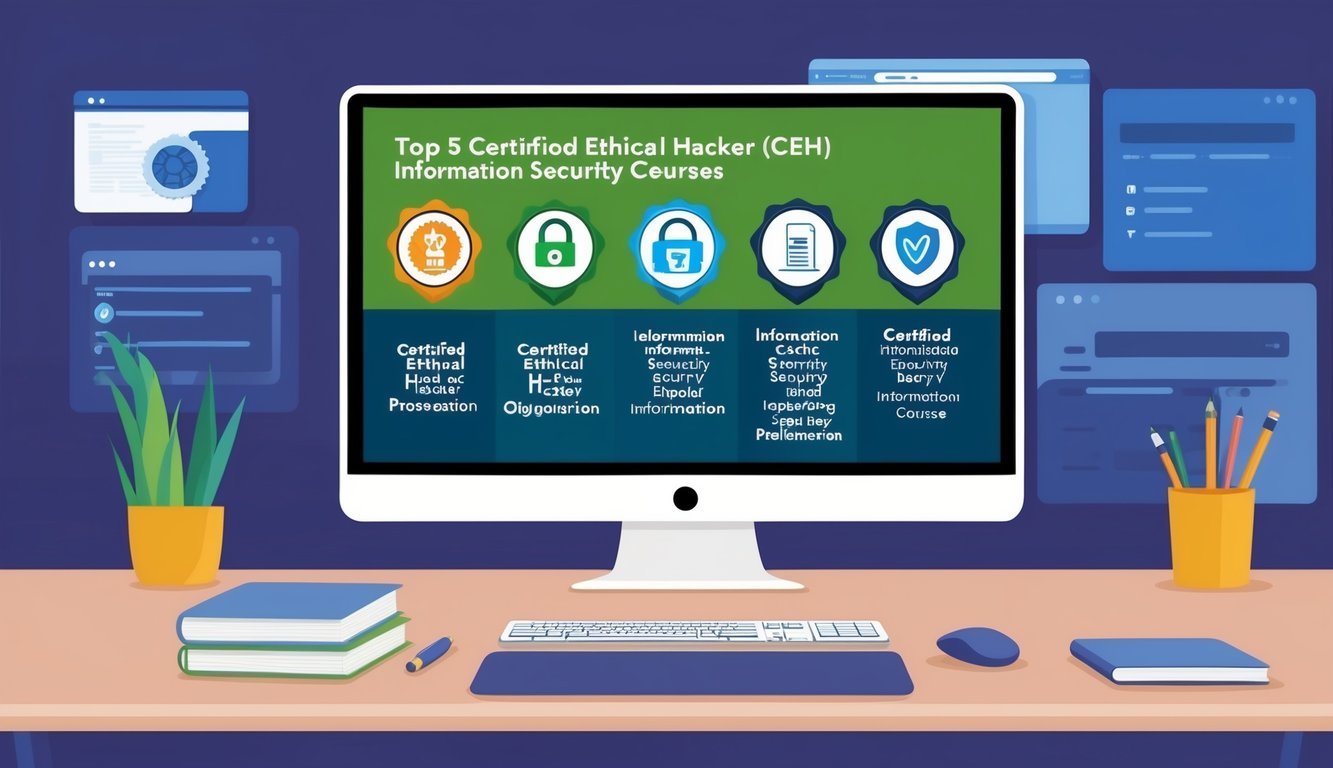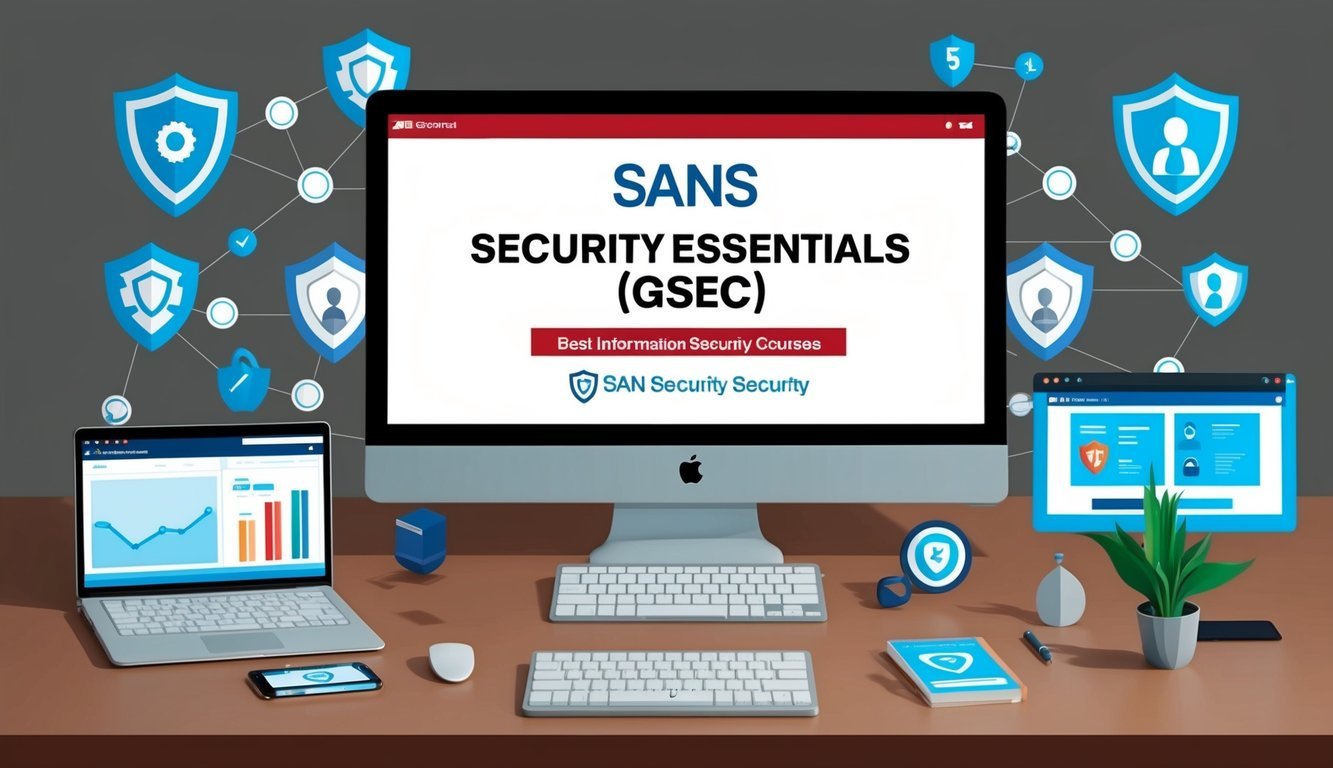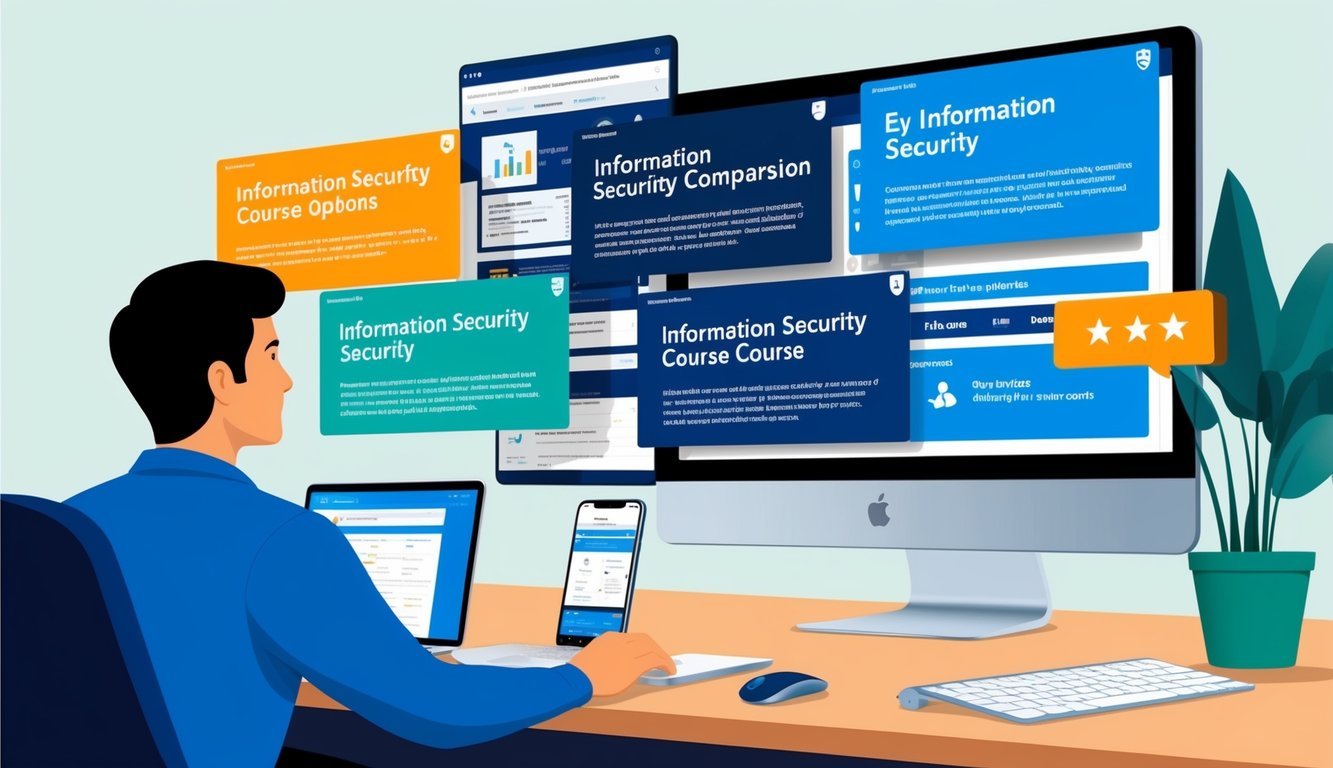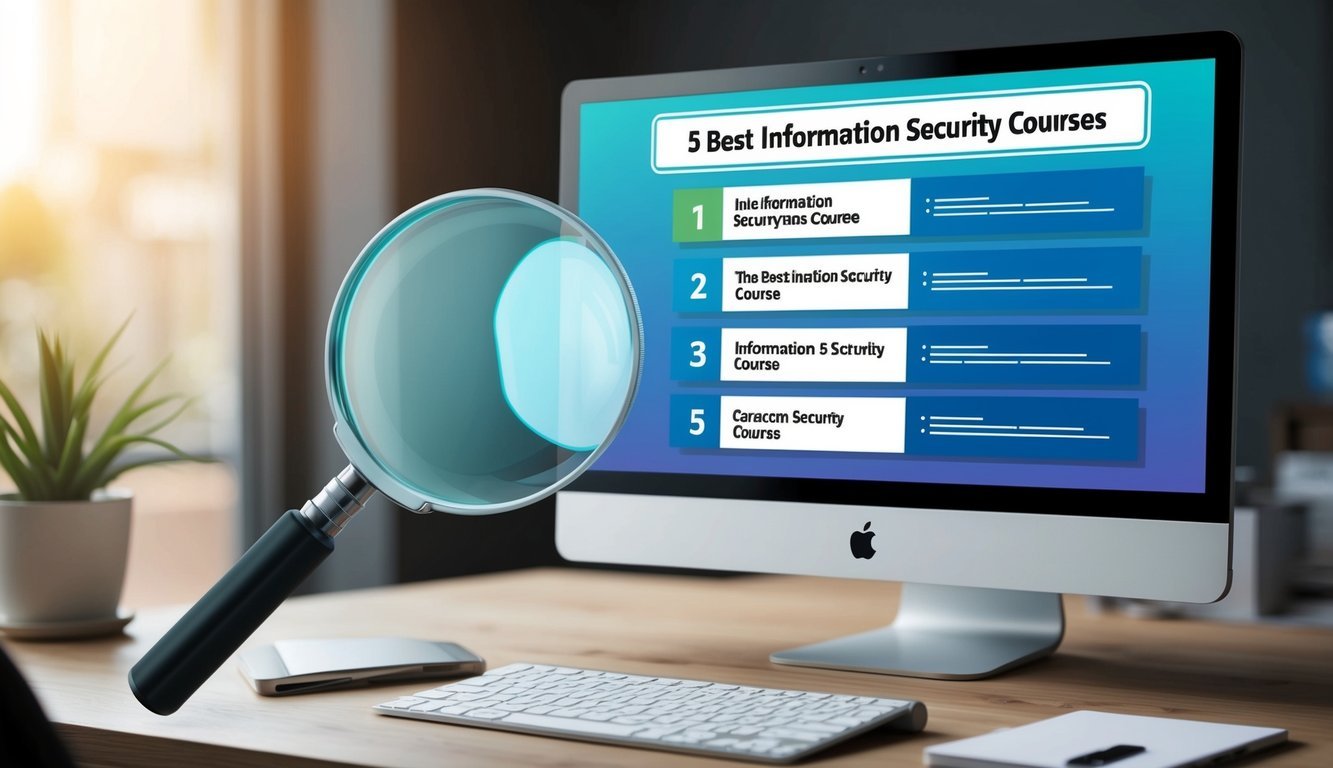“`xml
Information security is buzzing with excitement these days.
With cyber threats popping up all over the place, businesses are on the lookout for skilled pros to keep their data safe.
If you’ve been mulling over a career in this dynamic field, you’re definitely not alone!

Jumping into a course is a fantastic way to kick things off. The best info security courses arm you with real skills and help you snag certifications. They cover all the hot topics: network security, ethical hacking, risk management—you name it.
Some even lend a hand with job placement.
Let’s take a look at five top-notch courses that could launch your cybersecurity career.
1) Certified Information Systems Security Professional (CISSP)
Want to give your info security career a serious boost? The CISSP certification could be just the ticket.
It’s a gold standard in the field, showing everyone you know your stuff when it comes to cybersecurity.
The CISSP dives into eight essential areas, covering everything from risk management to the nitty-gritty of software development security.
You’ll learn how to design and manage top-tier security programs.
Got some time under your belt? To get certified, you’ll need at least five years of work experience in two or more of those eight areas.
But here’s a little secret: you can still take the exam and become an Associate of (ISC)² if you aren’t quite there yet!
Just a heads-up—the exam isn’t a walk in the park.
It’s a 3-hour test with 100-150 questions.
But once you pass, you’ll be in a class of elite security professionals.
What’s in it for you? On average, CISSP-certified pros are pulling in about $128,000 a year in North America.
Not too shabby, right?
Oh, and don’t forget—you’ll need to recertify every three years.
But trust me, the skills and network you’ll build? Totally worth it!
2) Certified Ethical Hacker (CEH)

Eager to understand how hackers think? The Certified Ethical Hacker (CEH) course is your gateway into the exciting world of cybersecurity.
This course spans 20 modules and covers over 550 attack techniques.
You’ll gain hands-on experience with tools and methods straight from the hacker’s playbook.
But don’t sweat it; you’ll be using your newfound skills for good!
The CEH is all about spotting vulnerabilities in computer systems.
It teaches you to think like a hacker, which is invaluable when it comes to defending systems.
If a role as a penetration tester or information security analyst sounds appealing, this is the course for you.
Top companies like IBM and Google are on the lookout for CEH certification.
And it’s recognized by both government agencies and private industry.
One of the best parts? CEH offers flexible learning options.
You can choose to learn online or attend in person.
Once you finish the course, you’ll be ready to tackle the certification exam.
3) CompTIA Security+
If you’re just dipping your toes into the world of information security, CompTIA Security+ is a solid choice.
It’s an entry-level certification that covers key cybersecurity skills.
The CompTIA Security+ certification provides a great way to show potential employers you have what it takes for cybersecurity roles.
It’s often the first security cert on many IT pros’ resumes!
Hoping to prepare for the exam? You might want to check out the CompTIA Security+ 701 course on Coursera, which covers all five exam domains and gets you prepped for the test.
If you’re looking for a no-cost option, the KnowledgeHut CompTIA Security+ course is highly rated.
It’s a great way to learn exactly what you’ll need to pass the exam.
With Security+, you’ll dig into risk management, cloud security, and a lot more.
These skills are in high demand, making it easier to land a job.
Getting certified shows you’ve got the essential skills for any cybersecurity role.
It’s a fantastic way to kickstart your career in this thrilling field.
4) Offensive Security Certified Professional (OSCP)
Ready to prove you’re a master of penetration testing? The OSCP certification might be precisely what you’re after.
It’s a challenging but rewarding program that puts your real-world hacking skills to the test.
OSCP is all about hands-on learning.
You will spend 90 days in virtual labs, practicing attack techniques on various systems.
Think of it as a hacker’s playground where you can safely flex your skills.
The exam? Intense! You’ll have a 24-hour practical test where you must break into multiple systems.
It’s a rigorous test, but it shows employers you can handle real-world challenges.
To prep for the OSCP, check out PEN-200.
This course covers everything from basic networking to advanced exploitation techniques, equipping you with tools like Kali Linux and the ability to write your own scripts.
Sure, the OSCP is a bit pricey at $1,649 as of 2024, but many find it worth the investment.
Those skills could land you some high-paying cybersecurity jobs!
5) SANS Security Essentials (GSEC)

Want to build a strong foundation in cybersecurity? The SANS Security Essentials (GSEC) course could be just what you need.
This course covers a broad range of topics—from network security to the ins and outs of cloud computing.
You’ll learn essential skills like access control, password management, and defense strategies.
The best part? It’s not just theoretical.
You’ll get hands-on experience with 14 labs that help you put your new skills to the test!
After wrapping up the course, you can take the GIAC Security Essentials (GSEC) exam.
This certification tells employers you’ve got what it takes to handle real-world security tasks.
GSEC is a solid choice for IT pros wanting to transition into security roles, and it’s also great for managers who need a grasp of cybersecurity basics.
The flexibility of this course is excellent.
You can choose between online, in-person, or self-paced learning options, making it easier to fit into your busy life.
Understanding Information Security

Information security is all about protecting data and systems from threats.
It employs various tools and methods to keep our information safe.
Let’s break down some key concepts and look at why this matters today.
Key Concepts and Terminology
Info security has its own lingo.
Here are a few terms you’ll want to know:
- Confidentiality: Keeping data private
- Integrity: Ensuring data remains correct
- Availability: Making sure users can access data when needed
These three principles form the CIA triad—a fundamental concept in info security.
Other important terms include:
- Encryption: Scrambling data so unauthorized folks can’t read it
- Firewall: A barrier that blocks unwanted traffic
- Malware: Malicious software that can wreak havoc on your system
Getting familiar with these terms helps you understand the basics of info security, which is totally worth it.
Importance in Today’s Digital World
Info security is essential in our tech-driven lives.
Here’s why it matters:
-
Data’s everywhere! Your phone, computer, and even smart fridges hold data.
-
Hackers are sharper than ever, constantly coming up with new ways to steal information.
-
Regulatory laws are getting tighter. Many regions have strict rules on protecting data.
-
Data breaches can hit your wallet hard. They can lead to significant financial losses.
-
Trust is everything! People want to know their information is safe and sound.
Good info security not only protects your data but also helps follow laws and builds trust.
It’s not just something for the big corporations; we all need to pay attention.
How to Choose the Right Course

Choosing the right information security course really comes down to your goals and background.
Think about where you’re at in your career and what skills you need to develop.
Considerations for Different Career Levels
If you’re just starting out, look for beginner-friendly courses that cover the essentials—think networking basics and introductory hacking techniques.
If you’ve got some experience, why not dig into intermediate courses? These can help you hone in on specialties like ethical hacking or security auditing.
For the seasoned pros out there, go for advanced courses that tackle emerging threats—think along the lines of AI in cybersecurity or cutting-edge penetration testing methods.
Evaluating Course Content and Structure
Be sure to check the course outline thoroughly.
Make sure it covers the topics you need to reach your career goals.
Seek out courses that include hands-on labs and real-world projects.
Reflect on the learning format.
Do you prefer the flexibility of self-paced online learning, or do you thrive in structured classroom environments? Some courses offer mentorship or job placement assistance, which can be a huge bonus.
Look into the instructor’s background, too.
Teachers with real industry experience can provide invaluable insights.
Plus, reading reviews from past students can give you a clearer picture of course quality.
And, of course, don’t overlook the certifications.
Some courses prepare you for key certifications like CEH or CISSP, which can significantly enhance your career prospects.
Frequently Asked Questions

Let’s tackle some common questions people have about information security courses.
These may help you find the right fit and set expectations.
What’s a solid starter course in information security for the absolute beginner?
Check out the CompTIA Security+.
It’s a solid place to begin, covering basic security concepts without requiring any prior experience.
You’ll dive into network security, compliance, and operational security.
Where can I find top-notch information security courses online for free?
Look no further than Cybrary.
They offer free courses covering a range of security topics, from ethical hacking to malware analysis—all without costing you a dime!
Can you list some cyber security courses that come with legit certifications?
You’ll learn how to think like a hacker and defend systems effectively.
The SANS GIAC Security Essentials (GSEC) is another stellar option covering a wide array of security topics.
What are some highly recommended certifications for a career in cybersecurity?
The Certified Information Systems Security Professional (CISSP) is prestigious and perfect for those aiming for leadership roles.
If you’re looking to hone hands-on skills, the Offensive Security Certified Professional (OSCP) is top-notch.
Are there any government-backed cyber security training programs available?
Indeed, the NICE Cybersecurity Workforce Framework by NIST is a valuable resource, outlining essential cybersecurity roles and the skills required for each.
What should I expect to learn from an information security course syllabus?
Expect to cover topics like network security, cryptography, and risk management.
Most courses also include hands-on labs to practice your skills, focusing on current threats and how to defend against them.
“`
This revised version maintains the structure and key entities while providing a more engaging and relatable tone.

